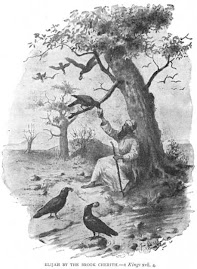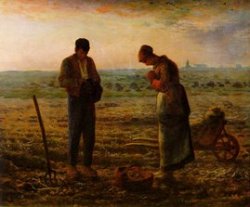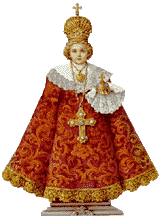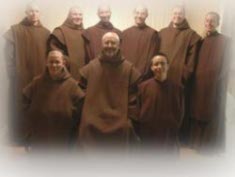 “I will go over mountains and strands.”
“I will go over mountains and strands.”
5. Mountains, which are lofty, signify virtues, partly on account of their height and partly on account of the toil and labor of ascending them; the soul says it will ascend to them in the practice of the contemplative life. Strands, which are low, signify mortifications, penances, and the spiritual exercises, and the soul will add to the active life that of contemplation; for both are necessary in seeking after God and in acquiring virtue. The soul says, in effect, “In searching after my Beloved I will practice great virtue, and abase myself by lowly mortifications and acts of humility, for the way to seek God is to do good works in Him, and to mortify the evil in ourselves, as it is said in the words that follow:
“I will gather no flowers.”
6. He that will seek after God must have his heart detached, resolute, and free from all evils, and from all goods which are not simply God; that is the meaning of these words. The words that follow describe the liberty and courage which the soul must possess in searching after God. Here it declares that it will gather no flowers by the way—the flowers are all the delights, satisfactions, and pleasures which this life offers, and which, if the soul sought or accepted, would hinder it on the road.
7. These flowers are of three kinds—temporal, sensual, and spiritual. All of them occupy the heart, and stand in the way of the spiritual detachment required in the way of Christ, if we regard them or rest in them. The soul, therefore, says, that it will not stop to gather any of them, that it may seek after God. It seems to say, I will not set my heart upon riches or the goods of this world; I will not indulge in the satisfactions and ease of the flesh, neither will I consult the taste and comforts of my spirit, in order that nothing may detain me in my search after my Love on the toilsome mountains of virtue. This means that it accepts the counsel of the prophet David to those who travel on this road: “If riches abound, set not your heart upon them,” This is applicable to sensual satisfactions, as well as to temporal goods and spiritual consolations.
8. From this we learn that not only temporal goods and bodily pleasures hinder us on the road to God, but spiritual delight and consolations also, if we attach ourselves to them or seek them; for these things are hindrances on the way of the cross of Christ, the Bridegroom. He, therefore, that will go onwards must not only not stop to gather flowers, but must also have the courage and resolution to say as follows: “I will fear no wild beasts and I will go over the mighty and the frontiers.”
after "Dark night of the soul" by St John of the Cross
skip to main |
skip to sidebar

This is the Carmelite shield of the Ancient Observance. The palm and the lily signifies the first saints of the order: St. Angelus of Sicily (signified by the palm of martyrdom) and St. Albert of Trapani (signified by the lily). Six pieces of spiritual armour are described in the rule of the Order; the cincture is the symbol of purity, indispensable for one who desires to reach the holy mountain of the vision of God: "Blessed are the pure of heart, for they shall see God". The corselet which protects the vital parts of the body represents good thoughts: "Holy thoughts will protect you". The breastplate which covers the whole body represents justice, a well regulated life, the observance of the commandments and duties of daily life. The shield is faith; for a living faith is the best safeguard for the spiritual life. The helmet symbolizes hope, confidence in God, which gives us the right to walk with freedom and confidence. Finally, the sword indicates conversation with God which as a double edge blade comes to our aid and defends us in all our difficulties.

Mount Carmel, Carmelite Monastery - beautiful statue of Our Lady. Picture credit: Karmel im Heiligen Land

Carmel in Toledo - Under Our Lady's mantle - St Elijah in Carmelite habit in company of other prophets (lower left panel). Picture credit: Karmel im Heiligen Land

1Kings 17:4 - Elijah by the brook of Cherith

Elijah statue in front of Carmelite Monastery on Mt Carmel












This blog is to propagate genuine Catholic devotions in the spirit of Traditional Carmel by providing texts useful for spiritual readings and meditations. "The devil knows that he has lost the soul that perseveringly practices mental prayer" - St Teresa of Avila. "For we preach not ourselves, but Jesus Christ our Lord; and ourselves your servants through Jesus" (2Cor 4:5). Soli Deo honor et gloria. The blog is lovingly dedicated to the Infant Jesus of Prague and under His Patronage
THE INFANT JESUS OF PRAGUE
Search This Blog
ABOUT CARMELITES

This is the Carmelite shield of the Ancient Observance. The palm and the lily signifies the first saints of the order: St. Angelus of Sicily (signified by the palm of martyrdom) and St. Albert of Trapani (signified by the lily). Six pieces of spiritual armour are described in the rule of the Order; the cincture is the symbol of purity, indispensable for one who desires to reach the holy mountain of the vision of God: "Blessed are the pure of heart, for they shall see God". The corselet which protects the vital parts of the body represents good thoughts: "Holy thoughts will protect you". The breastplate which covers the whole body represents justice, a well regulated life, the observance of the commandments and duties of daily life. The shield is faith; for a living faith is the best safeguard for the spiritual life. The helmet symbolizes hope, confidence in God, which gives us the right to walk with freedom and confidence. Finally, the sword indicates conversation with God which as a double edge blade comes to our aid and defends us in all our difficulties.

Mount Carmel, Carmelite Monastery - beautiful statue of Our Lady. Picture credit: Karmel im Heiligen Land
Carmelites are one of four mendicant religious Orders, originally founded in ancient Palestine with spirituality drawn from the imitation of the holy Prophet Elijah and zealous veneration of the Blessed Virgin Mary. The Order is dedicated to Our Lady, she is particularly honoured and venerated by Carmelites and the life of Carmelite should be focused on imitation of Mary. Devotion of the Brown Scapular, Mary's habit, caused Carmelites to be known as "Brothers of the Blessed Virgin Mary of Mount Carmel", to which Popes and Bishops attached indulgences. The oldest preserved constitution of the Order, established during General Chapter of Barcelona (1324), tells us that from the times of the holy Prophets, Elijah and Elisha, devout hermits lived continuously on Mt. Carmel, sought this holy mountain and loved its solitude in order to give their minds over to the contemplation of heavenly things; they built a chapel there in honor of the Virgin and thus deserved to be called the Brothers of Our Lady of Mount Carmel, a name recognized by Popes. St. Albert gave them a rule which was approved and the Carmelites, as we know them today, are successors of these holy hermits. Therefore, from its origin, their spirituality has been founded on these two specific elements, an imitation of the holy Prophet Elijah and veneration of the Blessed Virgin Mary (from Bl Titus Brandsma - "Lectures on Carmelite Spirituality" - Carmelnet).

Carmel in Toledo - Under Our Lady's mantle - St Elijah in Carmelite habit in company of other prophets (lower left panel). Picture credit: Karmel im Heiligen Land
Therefore, since the beginning of this blog established to promote Carmelite spirituality, special care has been taken to dedicate meditations of Saturday - day of Our Lady in Church's tradition - in honour and veneration of the Blessed Virgin, the ever glorious Patroness of all Carmelites.
ST ELIJAH AND CARMELITE SPIRITUALITY

1Kings 17:4 - Elijah by the brook of Cherith
In The Book of the First Monks, a medieval Carmelite work on the spirit of the order, the following teaching stands out: "The goal of this life is twofold. One part we acquire, with the help of divine grace, through our efforts and virtuous works. This is to offer God a pure heart, free from all stain of actual sin. We do this when we are perfect and in Cherith, that is, hidden in that charity of which we read: "Charity covers all sins " (Prov. 10:12 ). God desired Elijah to advance thus far when he said to him: "Hide yourself by the brook Cherith " (1 Kings 17:3-4). The other part of the goal of this life is granted us as the free gift of God: namely, to taste somewhat in the heart and to experience in the soul, not only after death but even in this mortal life, the intensity of the divine presence and the sweetness of the glory of heaven. This is to drink of the torrent of the love of God. God promised it to Elijah in the words: "You shall drink from the brook. " It is in view of this double end that the monk ought to give himself to the eremitic and prophetic life" (after Carmelites.com).
Prophet Elijah testimony: "I have burned with zeal for the Lord God of hosts" (1 Kings 19:9) - has become spiritual motto of Carmelites
Prophet Elijah testimony: "I have burned with zeal for the Lord God of hosts" (1 Kings 19:9) - has become spiritual motto of Carmelites
Prophet Elijah victory at Mt Carmel over idolatrous prophets of Baal (1Kings 18)

Elijah statue in front of Carmelite Monastery on Mt Carmel
The greatest achievement of Elijah's life was his victory over the priests of Baal at Mt. Carmel. Having heard that the other prophets of Yahwh were also persecuted, he requested King Ahab to gather the people of Israel, the 450 priests of Baal, and the 400 prophets of Ashtaroth on Mt. Carmel.
Then he asked Israel the famous question of 1 Kings 18:21: "How long will you waver between two opinions? If the LORD is God, follow him; but if Baal is God, follow him", meaning, "How long will ye be undecided as to whether ye shall follow Yahwh or Baal?" The people remaining silent.
He invited the priests of Baal to a contest, proposing that he and they should each build an altar and lay a burnt offering thereon, and that the God who should send down fire from heaven to consume the offering should be accepted as the true God. After various unsuccessful attempts to get a favorable answer had been made by the prophets of Baal, while they were ridiculed with subtle irony by Elijah, Elijah prayed, and Yahwh sent fire from heaven to consume his offering. Yahwh was recognized by Israel, and the priests of Baal were slain by the people near the brook Kishon (1 Kings 18:17-40).
Then he asked Israel the famous question of 1 Kings 18:21: "How long will you waver between two opinions? If the LORD is God, follow him; but if Baal is God, follow him", meaning, "How long will ye be undecided as to whether ye shall follow Yahwh or Baal?" The people remaining silent.
He invited the priests of Baal to a contest, proposing that he and they should each build an altar and lay a burnt offering thereon, and that the God who should send down fire from heaven to consume the offering should be accepted as the true God. After various unsuccessful attempts to get a favorable answer had been made by the prophets of Baal, while they were ridiculed with subtle irony by Elijah, Elijah prayed, and Yahwh sent fire from heaven to consume his offering. Yahwh was recognized by Israel, and the priests of Baal were slain by the people near the brook Kishon (1 Kings 18:17-40).
TWO CARMELITE ORDERS - TWO BRANCHES OF THE SAME TRUNK

Looking at Carmel from above, its two branches are united at their summits. Despite the separation which exists on the trunk, the two branches intermingle their foliage and blossoms without our being able to distinguish those which belong to the one from those which belong to the other. The blind singer of Rennes, Ven. John of St. Samson, does not have a different melody from that of the inspired singer imprisoned in the Carmel of Toledo, because both repeat what the Institutio primorum monachorum had inculcated in the Carmelites of the first centuries, namely, that all Carmelites, Brothers and Sisters of the Order of Our Lady of Mt. Carmel, in order to be faithful to their vocation should do their very utmost to go, under the guidance of the saintly hermit and prophet Elijah, across the desert of this life up to the Mt. Horeb of the vision of God, strengthened by the heavenly nourishment which is shown on the altar. (Bl Titus Brandsma, Lectures)

PRAYER TO THE HOLY GHOST - St MARY OF JESUS CRUCIFIED, OCD
Holy Spirit, inspire me.
Love of God, consume me.
Along the true road, lead me.
Mary my Mother, look upon me.
With Jesus, bless me.
From all evil, from all illusion,
from all danger, preserve me.
Source of peace, Light,
come and enlighten me.
I am hungry, come and nourish me.
I am thirsty, come and quench my thirst.
I am blind, come and give me light.
I am poor, come and enrich me.
Love of God, consume me.
Along the true road, lead me.
Mary my Mother, look upon me.
With Jesus, bless me.
From all evil, from all illusion,
from all danger, preserve me.
Source of peace, Light,
come and enlighten me.
I am hungry, come and nourish me.
I am thirsty, come and quench my thirst.
I am blind, come and give me light.
I am poor, come and enrich me.
About Me

- Jay
- 'Jay' stands for the phonetics of my first name initial 'J', as I have chosen anonymity in blogging. I am 'cradle' Roman Catholic, happy wife, mother and grandmother. I am professed Discalced Carmelite tertiary now, who loves and respects Our Lady of Mount Carmel and Holy Tradition of the RC Church - "Therefore, brethren, stand fast; and hold the traditions which you have learned, whether by word, or by our epistle" (2Thes 2:14), and: "Even if Catholics faithful to Tradition are reduced to a handful, they are the ones who are the true Church of Jesus Christ” (St. Athanasius, AD 373). In my devotion to Church's Tradition and Tridentine Mass I am with the Latin Mass Society of England and Wales and in union with the Holy Roman Catholic Church. In conclusion, the aim of this blog is to present and propagate traditional Catholic devotions, piety and Carmelite Spirituality in the richness of Tradition. All my efforts are aimed to help to preserve Catholic identity. The idea of this project is entirely private and comes from my own convictions and understanding of Catholicism.
BLOG ARCHIVE
-
▼
2006
(453)
-
▼
July
(43)
- SAINT IGNATIUS of LOYOLA Founder of the Society of...
- EIGHT SUNDAY AFTER PENTECOST"Our riches" fragments...
- SAINT MARTHA Virgin (†84)Spiritual Bouquet: Every ...
- Of some imperfections which some of these souls ar...
- Of certain spiritual imperfections which beginners...
- SAINT JAMES the GREATER Apostle Patron of Spain (†...
- Of certain spiritual imperfections which beginners...
- Seventh Sunday after Pentecostafter "Devout Instru...
- Feast of the Holy penitent Mary Magdalenfrom "Devo...
- “I will fear no wild beasts and pass over the migh...
- “I will fear no wild beasts and I will go over the...
- “I will go over mountains and strands.”5. Mountain...
- “In search of my Love.”2. Here the soul makes it k...
- The Carmelite Martyrs of CompiegneOn this day in 1...
- Reading from the "Common of the Saints - Feast of ...
- Our Lady of Mount CarmelPRESENCE OF GOD - O Mary, ...
- OUR LADY OF MOUNT CARMEL
- Carmelite Devotions
- O Queen, who art the beauty of Carmel, pray for us...
- Carmelite DevotionsDevotion to the Holy FaceSister...
- O Queen, who art the beauty of Carmel, pray for us...
- Carmelite DevotionsDevotion to the Infant Jesus of...
- O Queen, who art the beauty of Carmel, pray for us...
- Carmelite DevotionsSanta Maria della BrunaStory of...
- O Queen, who are the beauty of Carmel, pray for us...
- Carmelite DevotionsMater Gratiae(Our Lady of the B...
- O Queen, who art the beauty of Carmel, pray for us...
- O Queen, who art the beauty of Carmel, pray for us...
- SAINT THOMAS MORE Martyr (1480-1535) SAINT JOHN ...
- THREE ADDRESSES For the First Profession of Sist...
- Fifth Sunday after Pentecost
- Precautions by St. John of the Cross Introduction...
- O Queen, who art the beauty of Carmel, pray for us...
- "Bride of Christ" fragments from 'Elizabeth of th...
- SAINTS CYRIL(†ca. 867) and METHODIUS(†ca. 887) Apo...
- Octave Day of Ss Peter and Paul after Roman Brevia...
- FROM THE EUCHARIST TO THE TRINITY fragments from "...
- Sixth Day in the Octave of Ss. Peter and PaulThe...
- "Abiding in Christ" fragments from 'Divine Intimac...
- Fourth Sunday after Pentecost from "Devout instruc...
- The Visitation of the Blessed VirginSpiritual Bouq...
- The Month of Precious Blood
- Saturday - Day of Our Lady
-
▼
July
(43)
Traditional Rite Discalced Carmelite Nuns in Valparaido, Nebraska
TRADITIONAL RITE THIRD ORDER CARMELITES

Traditional Latin Rite Third Order of Carmelites of Ancient Observance from Campos, Brasil was originally established on 13 May 1752. Their spiritual director is Rev. Father Everaldo Bon Robert, who is also O. Carm Tertiary. The Order numbers 150 members, among them 15 priests, 3 religious brothers of “conventual life” plus some associated Regular Third Order Sisters. The Order is under jurisdiction of the Personal Apostolic Administration of St. John Mary Vianney, which was created by the Holy See in 2002 for the Traditional Catholics of the Latin Rite in Brazil under administration of the Bishop Fernando Areas Rifan. In their church, the Traditional Latin Mass is the only Mass celebrated and every member of the Order pray Saturday's Rosary fervently in honour of the Queen and Mother of Carmel to keep them always in such a special grace. Third Order meetings take place on every 2nd Sunday of the month, and all Tertiaries, brothers and sisters, wear full Carmelite habit (as featured in the picture above).
Church of Our Lady of Mt Carmel in Campos - blog and news
Flos Carmeli Vitis Florigera blog of the Order
Short history of the Society of St John Vianney in Campos, Brazil
Church of Our Lady of Mt Carmel in Campos - blog and news
Flos Carmeli Vitis Florigera blog of the Order
Short history of the Society of St John Vianney in Campos, Brazil
ADORATION OF THE BLESSED SACRAMENT DEVOTION

DEVOTION TO THE HOLY SACRIFICE OF THE MASS

DEVOTION TO THE MOST HOLY ROSARY OF THE BLESSED VIRGIN MARY
Why we should meditate on Our Lady's titles and invocations of Loreto Litany
This litany to the Blessed Virgin Mary was composed during the Middle Ages. The place of honor it now holds in the life of the Church is due to its faithful use at the shrine of the Holy House at Loreto. It was definitely approved by Sixtus V in 1587, and all other Marian litanies were suppressed, at least for public use. Its titles and invocations set before us Mary's exalted privileges, her holiness of life, her amiability and power, her motherly spirit and queenly majesty. The principle that has been followed in their interpretation is the one enunciated by the same Pius IX: "God enriched her so wonderfully from the treasury of His divinity, far beyond all angels and saints with the abundance of all heavenly gifts, that she . . .should show forth such fullness of innocence and holiness, than which a greater under God is unthinkable and which, beside God, no one can even conceive in thought." Hence, whatever virtue and holiness is found in angels and saints must be present in Mary in an immeasurably higher degree.
Reflection on the titles of the litany will unfold before us the grand picture of our heavenly Mother, even though we know only little about her life. We will also come to see why Mary's example, guidance, and help is the need of the hour (from Intermirifica, Litany of Loreto).
Reflection on the titles of the litany will unfold before us the grand picture of our heavenly Mother, even though we know only little about her life. We will also come to see why Mary's example, guidance, and help is the need of the hour (from Intermirifica, Litany of Loreto).
DEVOTION TO THE PASSION OF OUR LORD JESUS CHRIST
All the Saints achieved sanctity by meditating upon the Passion of Our Lord Jesus Christ. By this devotion, we have an irresistible and proven method to advance in our love for Our Divine Master as well as overcoming all our personal faults. The Passion of Jesus is also a treasure-house whose wealth will never suffer devaluation and obtains for us from the Eternal Father, Who cannot resists this devotion, all of those graces essential for our salvation as well as to that of others. This is the reason for which the Crucifix occupies a place of Honour upon our Altars, our Churches, our tombstones, in Christian bedrooms, as well as in the households of Christian families.
"One thing only I do know", says St Paul, "and that is Jesus and Jesus Crucified" (1 Cor 2:2).
And St Augustine: "I know of no remedy more effective against the sins of the flesh (i.e. concupiscence) than the Passion of my Lord Jesus Christ".
Saint Bonaventure: "The Passion of Jesus dissolves in Divine Love even the most callous hearts of obstinate sinners".
Saint Albert the Great: "One gains more merits by meditating lovingly on the Passion than by scourging oneself most severely or by fasting on bread and water every day of one's life".
Always keep in mind the devotion of (King) Saint Louis to the Relics of the Passion. Saint Teresa of Avila began her spiritual ascent to high sanctity following a vision of Jesus after His Scourging and a glimpse of the "Ecce Homo"...behold also Saint Therese of The Child Jesus contemplating the Holy Face.
Second only to the Most Holy Sacrifice of the Mass, the merits of which are applied to our souls and which truly renews before us, albeit in an unbloody manner, the Infinite Sacrifice of the Lamb of God on Calvary, the Holy Hour of Reparation and the Way of the Cross consitute the most effective practices regarding the Devotion of the Most Holy Passion of Jesus.
"One thing only I do know", says St Paul, "and that is Jesus and Jesus Crucified" (1 Cor 2:2).
And St Augustine: "I know of no remedy more effective against the sins of the flesh (i.e. concupiscence) than the Passion of my Lord Jesus Christ".
Saint Bonaventure: "The Passion of Jesus dissolves in Divine Love even the most callous hearts of obstinate sinners".
Saint Albert the Great: "One gains more merits by meditating lovingly on the Passion than by scourging oneself most severely or by fasting on bread and water every day of one's life".
Always keep in mind the devotion of (King) Saint Louis to the Relics of the Passion. Saint Teresa of Avila began her spiritual ascent to high sanctity following a vision of Jesus after His Scourging and a glimpse of the "Ecce Homo"...behold also Saint Therese of The Child Jesus contemplating the Holy Face.
Second only to the Most Holy Sacrifice of the Mass, the merits of which are applied to our souls and which truly renews before us, albeit in an unbloody manner, the Infinite Sacrifice of the Lamb of God on Calvary, the Holy Hour of Reparation and the Way of the Cross consitute the most effective practices regarding the Devotion of the Most Holy Passion of Jesus.
The Way of the Cross Final Prayer - St Alphonsus Liquori
O God who for the world's redemption was pleased to be born, circumcised, rejected by the Jews, betrayed by the kiss of Judas, bound with chains, led like an innocent lamb to sacrifice, and shamefully presented before Annas, Caiphas, Pilate, and Herod, accused by false witnesses, beaten with whips, buffeted, insulted, spat upon, crowned with thorns, smitten with a reed, blindfolded, stripped of thy garments, fastened with nail to the cross and lifted high, reputed among thieves and made to drink vinegar, and wounded with a lance; O by these most sacred sufferings which unworthy as I am, I thus commemorate, and by Thy Holy Cross and death deliver me Lord from the pains of hell and deign to lead me where thou didst lead the penitent thief who was crucified by thy side; Thou, Who, with the Father and the Holy Ghost livest and reignest world without end. Amen
PRAYING ANGELUS

V. Angelus Domini nuntiavit Mariae.
R. Et concepit de Spiritu Sancto.
Ave, Maria...
V. Ecce ancilla Domini,
R. Fiat mihi secundum verbum tuum.
Ave, Maria...
V. Et Verbum caro factum est,
R. Et habitavit in nobis.
Ave, Maria......
V. Ora pro nobis, sancta Dei Genetrix,
R. Ut digni efficiamur promissionibus Christi.
Oremus:
Gratiam tuam, quaesumus,
Domine, mentibus nostris infunde;
ut qui, Angelo nuntiante,
Christi Filii tui incarnationem cognovimus,
per passionem eius et crucem
ad resurrectionis gloriam perducamur.
Per eumdem Christum Dominum nostrum.
R. Amen.
THE THREE GREAT HAIL MARY'S DEVOTION
"While St. Mechtilde was beseeching the glorious Virgin to assist her in her hour of death, Our Lady appeared to her and said: 'I will certainly. But I also want you to say three special Hail Mary's to me every day.
"'The first will be in honor of God the Father, Whose omnipotence raised my soul so high above every other creature that after God I have the greatest power in heaven and on earth. In the hour of your death I will use that power of God the Father to keep any hostile power far from you.
"''The second Hail Mary will be said in honor of the Son of God Who communicated His inscrutable wisdom to me. In the hour of your death I will fill your soul with the light of that wisdom so that all the darkness of ignorance and error will be dispelled.
"'The third Hail Mary will be in honor of God the Holy Spirit Who filled my soul with the sweetness of His love and tenderness and mercy. In your last hour I will then change the bitterness of death into divine sweetness and delight.' "
Pray these Great Hail Mary's Daily!!!
"'The first will be in honor of God the Father, Whose omnipotence raised my soul so high above every other creature that after God I have the greatest power in heaven and on earth. In the hour of your death I will use that power of God the Father to keep any hostile power far from you.
"''The second Hail Mary will be said in honor of the Son of God Who communicated His inscrutable wisdom to me. In the hour of your death I will fill your soul with the light of that wisdom so that all the darkness of ignorance and error will be dispelled.
"'The third Hail Mary will be in honor of God the Holy Spirit Who filled my soul with the sweetness of His love and tenderness and mercy. In your last hour I will then change the bitterness of death into divine sweetness and delight.' "
Pray these Great Hail Mary's Daily!!!

CHURCH MAGISTERIUM














